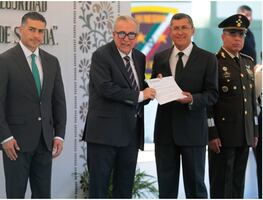Más Información

Videojuegos, el nuevo gancho del crimen para captar menores; los atraen con promesas de dinero y poder

“Vamos a dar apoyo a los pequeños agricultores por sequía en Sonora”; Claudia Sheinbaum instruye a Berdegué

Derrota de México en disputa por maíz transgénico contra EU; estos son los argumentos de Sheinbaum y AMLO para prohibirlo
Flight tickets in Mexico are now showing their highest price increase in 23 years, mostly due to the holiday season, the depreciation of the Mexican Peso against the U.S. dollar , and rising jet fuel costs.
According to the National Institute of Statistics and Geography (INEGI) , air transportation prices skyrocketed by 45.5% during the first half of April compared with the same period last year, which resulted in the steepest increase in flight prices since 1996.
A strong factor behind this sudden price increase was the month change for Mexico’s Holy Week celebration . While in 2018, the vacation period happened in March, this year it came in April. However, there is a whole set of factors that contributed to this increase as well.
Armando Bojórquez, head of the Viajes Bojórquez franchise network
, commented that airlines had raised flight ticket prices to make up for the major costs resulting from the constant depreciation of the Mexican peso and an increase in jet fuel prices.
The foreign exchange loss has pushed costs associated with ticket prices such as international airport tariffs, which are set in U.S. dollars, as well as leases and financing for Mexican airlines.
The average U.S. dollar price was set at MXN$19.30 during the first half of April, which was 80 cents higher than during the first period in 2018, when U.S. dollars were sold at MXN$18.50 through CitiBanamex.
On the other hand, jet fuel prices showed a 91 cents increase during the first two months of the present year, with a cost of MXN$14.01 pesos per liter in February at Mexico City’s International Airport. This represented a MXN$1.66 increase compared to the same month in 2018.
The supply of jet fuel represents around 30% of the airlines’ operation costs
, according to the International Air Transport Association (IATA).
Jet fuel production in Mexico is barely enough to cover for a third of total demand, which has led private companies to purchase their fuel from the United States, with prices subject to exchange rate volatility.
Armando Bojórquez added that the compensation policy for passengers during long delays attributable to the airlines has also led to higher costs.
“The shortage of supply and dynamism of transport demand allows the companies to get away with it,”
stated Bojórquez, who also leads the Association for Culture and Tourism in Latin America (Actual).
According to the INEGI, airports in south and central Mexico have shown the largest rate increase at the national scale.
dm








